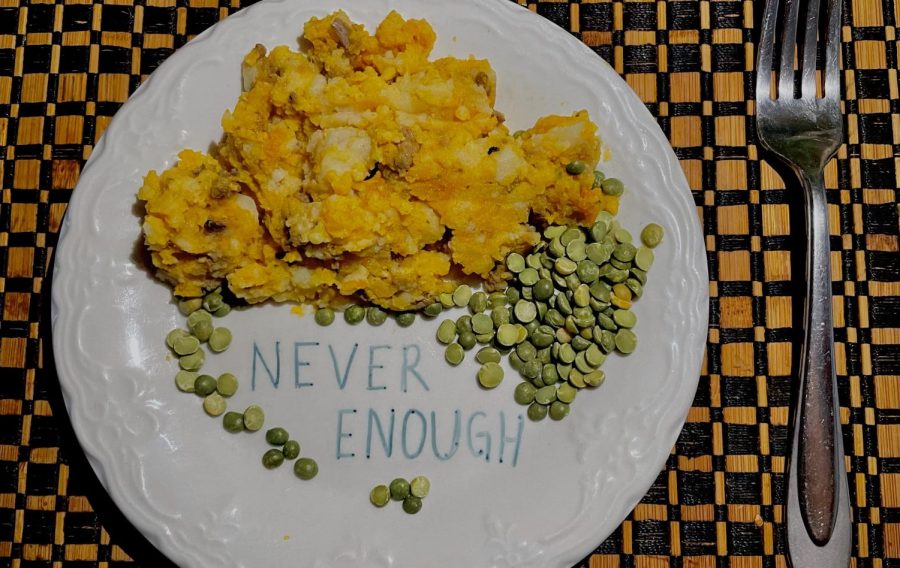Being Hispanic Contributed to My Eating Disorder
Latinas face comments about the way they eat, how much they eat, and their body image.
April 3, 2023
When I’ve had a bad day, nothing picks me up better than a perfectly grilled and salted carne asada, served with spicy salsa and soupy black beans over rice. Food is my refuge. It’s where I go when I’m feeling lost and need comfort. When I’m happy or sad. It’s also my enemy.
You see, I’ve always been chubby. I’m also Hispanic. My family is Chilean, and in Latin culture, body weight, especially a girl’s weight, is an explosive topic.
By the age of seven, I had been on a series of fad diets that dictated what I could eat and couldn’t. One month, I was restricted from carbs. So no spaghetti, bread, or potatoes. The next month, it was no fats or proteins. So no avocado, dairy, or red meats.
I was also forced to do multiple athletic activities. During the winter, it was volleyball. During the spring, it was tennis. And I sucked at both. During the fall it was ballet, but not for long after I was told “I was too fat” to dance. The only thing I had a passion for was swimming, but because the focus was to lose weight and not the enjoyment of the sport, I hated it.
To make things worse, I felt uncomfortable eating in my own home because my family would police what I ate and comment if I was eating ‘bad’ food. So, when I wasn’t under their watchful eye, I would binge. At school, I would eat multiple trays of cafeteria food, or if I was at a friend’s house, I would sneak into their kitchen to eat during hangouts or sleepovers. Sometimes, I was so hungry, I could eat a whole box of Oreos in one sitting. Other times, my body craved food so much, but I wasn’t even hungry.
I felt so alone, but I wasn’t. According to a paper published by The International Journal of Eating Disorders, “Prevalence and Correlates of Eating Disorders in Latinos in the U.S.,” Hispanic adolescents with poor body images often suffer from eating disorders more so than any other demographic. Although the binging and purging is the physical part, for Hispanic girls, it’s the cultural part that makes it worse.
In Latin culture, the best compliment you can get from a Hispanic is ‘You lost so much weight.’ It would make my day hearing this and even now, sometimes I crave the attention and seek validation from those backhanded compliments. When I hung out with my family and friends, the comments would roll off their tongues. “You’ve lost weight.” “You’ve gained weight.” “You would look better if you lost or gained this amount.”
And, it’s something that is passed down from mother to daughter. All my life, I would hear my mom complain about her body every time she looked in a mirror. She would eat a lot of food, feel guilty, make herself throw it all up, and the cycle would continue. And not just my mom either. When I was young, whenever all the moms gathered and talked, the subject was always the new diets they were on and how much weight they had gained or lost. It continues even today.
And the worst part, all of this is normalized and goes untreated within my community. According to the research study, “Understanding Eating Disorder Among Latinas,” published by The National Institute of Health, many Latinas report suffering associated with eating disorders (EDs,) but only a small percentage of them seek treatment. One reason is a lack of awareness that EDs exist.
Diana Mesa is a registered dietitian and founder of En La Mesa Nutrition, a company based in South Florida that helps Hispanics recover from disordered eating and guides them to love their bodies while eating cultural foods. She says that she sees a pattern of preoccupation with weight and food issues in the Hispanic community. Mesa set this philosophy as her company mission because, as a Latina, she felt that her college classes didn’t quite capture how culture and ethnicity affect diet and nutrition.
“Most of my clients are Latinxs, like myself, and our foods have a horrible reputation for being ‘unhealthy,’” says Mesa. “I encourage them to add foods in instead of taking foods out because I want them to know that they can enjoy their rice and beans and still honor their health.”
Another factor is the stigma of seeking help and treatment. Dr. Adriana Garcia, a licensed counselor from South Florida, says there seems to be a fixed mindset around receiving help, like therapy. She also says that seeking help is often viewed as “crazy” in the Hispanic community.
“Ah yes, the famous stigma that we have been carrying for generations. I think people still carry it,” said Dr. Garcia.
I have managed to overcome my eating disorder with no professional help by mostly researching how to control my eating habits and watching YouTube influencers on their eating disorder recovery journeys. But, it’s not something I recommend. The intrusive thoughts and guilt I have when I eat food still linger.
I am told to love my food and hate my body, and I am sick of it.
If you are struggling with an eating disorder there is help. The National Eating Disorder Association has information, resources, and treatment options for eating disorders. Visit www.myNEDA.org. If you are in a crisis and need help immediately, text “NEDA” to 741741, or call the Helpline at (800) 931-2237.





Lucia Nieves • Apr 5, 2023 at 1:18 pm
Also growing up in a hispanic background, my mom would tell us we had to sit at the table until we finished our plate. That would force me to over eat and not stop even though I was full. Also the fact that I didn’t want to waste food so I would clean the plate. So growing up all these years with the habit of eating everything on my plate contributed to being over weight. Not so long ago I heard on a podcast that some people eat for enjoyment and this person explained that they took in the mindset to listen to your body and only eat when your hungry. This realization unfogged my mind and I took in this new thought and applied it to my diet habits. I lost a good amount of weight and I feel healthier. Then came the abundant amount of comments about how I lost so much weight and “Tell me your secret” and “How did you do it?”. When my mom noticed she in a way accused me of starving myself and seemed more concerned then supportive. You can’t ever win coming from this background.